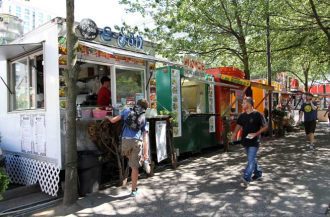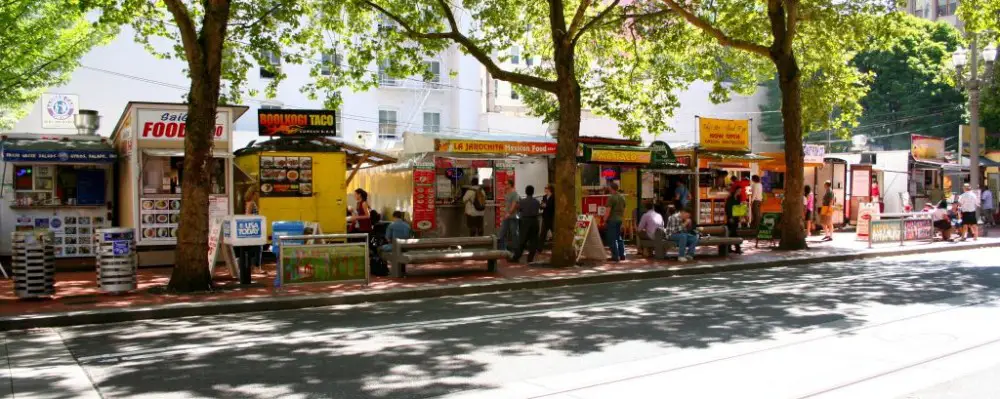Contributing writer for Wake Up World
Nong Poonsukwattana arrived in American from Bangkok, Thailand with $70 in her pocket. After waitressing at five different restaurants — every day and night of the week for six years — she finally broke free in 2009 and purchased a food cart, in the hope that she could have her own slice of the American dream. Happily, it worked. She’s now the proud owner of two successful food cart businesses, plus a bricks-and-mortar commercial kitchen with 10 employees. She even bottles her own sauce.
“I think it’s always good to support local business, mom-and-pop shops, or small businesses with different ideas. It’s beautiful to see people fight for a better future for themselves,” she told Yes! Magazine.
Nong is part of a growing trend of up-and-coming entrepreneurs who are embracing a bid for a better life — with none other than the humble food cart.
A Food Revolution in the Pacific Northwest
Portland, Oregon is experiencing a renaissance of sorts, one where food is the driving factor. Due to the city’s permissive zoning laws, vendors are able to set-up their food carts in private lots. The result is nothing short of inspiring.
Instead of bleak, deserted lots strewn across the urban landscape, Portland now has a colorful menagerie of community spaces, which feature cuisine from around the world. Because of the 440 food carts peppered throughout the metro area, neighborhoods are more livable, walkable and pedestrian-friendly.
Competition is fierce, but the food is off the charts. Nong’s little cart — Khao Man Gai — is known for her Hainan chicken where “the bird poached in fragrant stock until silky, the rice just so, the trademark dark, gingery sauce [is] as addictive as crystal meth.” [source] Or Tiffin Asha, which offers a brilliant fusion combining a Pacific Northwest sensibility toward local food and striking Indian cuisine. Says food author Karen Brooks:
“Only Portland can offer you pakora-fried chicken wrapped in a dosa and served from a colorful food cart window. Think exotic chicken McNuggets, gloriously dunked and fried in spicy chickpea-rice flour, then wrapped in a dosa glazed with neyyi (clarified butter) and local yoghurt. The crispy-tangy dosa cone pops with spice, crunch and surprise. This is fried chicken and greens reborn, ecstatically. I could eat it every day.”
Then there’s Artigiano, run by Cordon Bleu trained chef Rachael Grossman, whose creations include yukon gold gnocchi with caramelized onions and cream, as well as handmade pasta produced daily in the cart’s minuscule kitchen.
Many of the vendors are first-generation immigrants who are sharing their food traditions. Wolf and Bear serves Israeli cuisine from owner Jeremy Garb’s homeland — but with a twist. “It’s inspired by food in Israel, but we sprout our chickpeas and grill everything and don’t use a deep fryer,” says co-owner Tanna TenHoopen Dolinsky.
To date, the Wolf and Bear employs a dozen people with two locations. They hope to open a restaurant in the future. The owners believe Portland is unique in the opportunities available, and proof of this is found in the success of the food cart culture:
- Sixty-three percent of food truck vendors say they can support themselves and their families.
- Forty-nine percent of food truck vendors own a home.
- Truck owners generally make $50,000 to $75,000 a year. Some make upwards of $200,000 to $500,000.
But it’s not easy money. It takes hard work, a pinch of luck and a whole lot of dedication to live the life of food cart success…
Take Gail Buchanan and Emily D. Morehead, who own The Big Egg. For years, the pair dreamed of opening a restaurant. They saved their money, developed menu items and were experienced in the food service industry. Then the economy tanked in 2008 and getting a small business loan during the recession was out of the question. It forced Buchanan and Morehead to switch gears and downsize. One day, the opportunity for a custom-designed food cart came knocking — and they never looked back. They do, however, put in many hours toward their labor of love — both working 70 hours a week, most of which is spent prepping menu items. Like many successful food vendors, they plan on opening a restaurant soon.
Food Network, Sunset, Bon Appétit and Saveur have all run features on the food cart phenomena in Portland. You can even take a food cart walking and tasting tour where, according to Portland Walking Tours, you’ll be shown the very best food carts — not just the best-known — on a “two-hour trek of tempting tastes” with local expert guides. The food flavors range from African, Asian and British, to Czech, Cuban and Cambodian — as well as everything in-between.
Who’s in?
Article sources:
- www.yesmagazine.org/…/portland-s-food-truck-heaven
- www.theguardian.com/…/top-10-food-trucks-portland-oregon
- www.portlandwalkingtours.com/…/flavor-street-food-cart-tour
About the author:
 Carolanne Wright enthusiastically believes if we want to see change in the world, we need to be the change. As a nutritionist, natural foods chef and wellness coach, Carolanne has encouraged others to embrace a healthy lifestyle of organic living, gratefulness and joyful orientation for over 13 years.
Carolanne Wright enthusiastically believes if we want to see change in the world, we need to be the change. As a nutritionist, natural foods chef and wellness coach, Carolanne has encouraged others to embrace a healthy lifestyle of organic living, gratefulness and joyful orientation for over 13 years.
Through her website Thrive-Living.net, she looks forward to connecting with other like-minded people from around the world who share a similar vision. You can also follow Carolanne on Facebook, Twitter and Pinterest.
Recommended articles by Carolanne Wright:
- Renowned Harvard Psychologist Says ADHD is Largely a Fraud
- Antibiotics Shown to Impair Memory, Stop Growth of New Brain Cells
- Plastic Waste in the Ocean Will Outnumber Fish by 2050
- Mind Control, Subliminal Messages and the Brainwashing of America
- Plastic-Eating Mushroom Discovered in the Amazon Rainforest — A Solution for Our Trash Saturated World?
- Over 100 Scientific Studies Agree: Cannabis Annihilates Cancer
- Why Every Parent Should Consider Unschooling
- First U.S. City Produces More Electricity Than It Uses — With 100% Renewable Technology
- If You Care About Animals and the Earth, Here’s Why You Need to Boycott Palm Oil Immediately
- Basic Income Guarantee: A Surprisingly Cost-Effective Method for Eliminating Poverty
- Instead of Punishment, This School Teaches Mindfulness and Yoga — With Stunning Results

If you've ever found value in our articles, we'd greatly appreciate your support by purchasing Mindful Meditation Techniques for Kids - A Practical Guide for Adults to Empower Kids with the Gift of Inner Peace and Resilience for Life.
In the spirit of mindfulness, we encourage you to choose the paperback version. Delve into its pages away from screen glare and notifications, allowing yourself to fully immerse in the transformative practices within. The physical book enriches the learning process and serves as a tangible commitment to mindfulness, easily shared among family and friends.
Over the past few years, Wake Up World has faced significant online censorship, impacting our financial ability to stay online. Instead of soliciting donations, we're exploring win-win solutions with our readers to remain financially viable. Moving into book publishing, we hope to secure ongoing funds to continue our mission. With over 8,500 articles published in the past 13 years, we are committed to keeping our content free and accessible to everyone, without resorting to a paywall.








